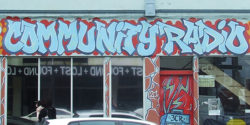Like many of you in the U.S. and around the world, I’m still trying to make sense of the presidential election and its outcome. And, by “make sense,” I mean determine what actions I should and can take to help ensure the safety and security of people who have been targeted by the rhetoric of our president-elect and many of his allies and supporters. Supporting and strengthening community radio is most definitely one vitally important action.
Radio is still a pervasive medium in this country, with 91% of Americans over the age of 12 tuning in every week. It remains one of the most efficient and effective ways to communicate to a community, with extremely few listeners facing barriers that prevent them from receiving broadcast signals.
One hallmark feature of community radio is providing an open microphone for people from communities that are underserved by other broadcast media. Community stations don’t chase the largest audience or the most affluent demographics. Instead they seek to serve people who get left out of that equation.
While it’s true that public radio stations and networks also make an effort to cover diverse and marginalized communities, public radio generally hews to a more traditional notion of journalism, with reporters and editors mediating coverage closely. This doesn’t mean that reportage is necessarily unfair or biased against those being reported on–and there is some very good reporting out there–but it always carries that risk which every journalist and news organization must negotiate, with varying degrees of success.
A crucial distinction between public and community radio is that the latter attempts to provide unmediated airtime, where individuals and representatives from communities have an opportunity to speak for themselves, with minimal or no editing. Whether this is in the form of weekly programs dedicated to the issues and interests of particular communities, or through live long-form interviews that aren’t limited to sound-bites, community radio emphasizes direct communication to the audience.
This is important for two reasons. First, hearing people who share your experience and come from your community on the radio is validating, no matter who you are. But it’s even more powerful when these voices and experiences are otherwise rarely heard, helping to strengthen ties and build awareness of common values, challenges and solutions.
Second, exposing listeners to a diversity of less-heard-from voices builds empathy and allegiances, building awareness of commonalities amongst a wider group of people.
In this regard, I believe it’s critical that privileged middle class people hear from those less privileged who are disproportionately threatened and affected by the expression of political and economic power. Not for mere awareness, but for informing and guiding action to protect and improve lives, especially those less privileged.
This has been true since the advent of community radio. It only becomes all the more apparent when faced with the present circumstances–unprecedented in many of our lives–where a president-elect explicitly campaigned on promises to test, exclude and round up religious and racial minorities. And, unfortunately, that’s only a part of the threat, as access to health care, abortion and contraception are also under peril.
I also don’t want to leave out the fact that community radio supports and broadcasts journalism that is unflinching in its investigation of power and economics, regardless of what party is in control. From national programming like Democracy Now!, Making Contact and Free Speech Radio News, to local news programming, community radio has been shining a light in the dark for more than a half century. We need that light now.
I know no more than you what will happen in the next two months, or what will happen after inauguration day. I can hope for the best, but that doesn’t mean squat in the face of too many signal flares that have been launched in the last eighteen months, where powerful people have made very threatening and scary promises to get elected. It’s time to prepare for the worst.
If you haven’t before, or haven’t in a long time, it’s time to support your local community stations in any way you can, with your money, your time, your energy and attention. If you’re already a supporter, find a way to give more and build a bigger, stronger audience for this vital information and service.
Finally, I have a request for readers who are like me: able, white, male and middle-class. In this environment the best way to support your community radio station is not to find your way on air, but to help others be on air–women, people of color, people from native and indigenous communities, trans and non-cisgendered people, differently abled people, and religious minorities–especially those who are explicitly targeted by our new national executive.
If you’re a white guy who’s already on the air use your time and voice to actively and unmistakably support and advocate for others not like yourself. Wherever possible find time to feature their voices, unfiltered and unmediated. Also, consider giving up your airtime for people and communities who simply need it more.
Now is not the time for white guys to make demands for what they think is right, but to understand the needs of others less privileged, and support them in having their voices amplified, so that their own lives and their communities may be protected and served.



